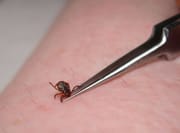
Adapted from an article by Merritt Melancon, news editor with the UGA College of Agricultural and Environmental Sciences
Ticks in Georgia
Ticks are in every part of Georgia. The most common ticks in Georgia are lone star ticks, carriers of uncommon diseases called “ehrlichiosis.” However, the American dog tick is also present in the state, and it is known to carry Rocky Mountain spotted fever—a flu-like illness that can cause complications for young children and those with suppressed immune systems.
The best course of action to prevent disease is to avoid tick bites altogether, said Nancy Hinkle, a UGA Extension veterinary entomologist.
She advocates:
- Wear long pants tucked into your socks or boots when walking or working in heavy brush. “It does look dorky, but it’s the most effective way to protect yourself from ticks,” she said. “The ticks have to crawl all the way up your boot and up your pants leg before they get to you, and that’s more of a chance for them to fall off or for you to find them before they attach.”
- Bug repellents that contain DEET to repel mosquitoes will work somewhat, but they are far from bulletproof.
- Repellents containing the pyrethroid, permethrin, work best to repel ticks, Hinkle said. The key is to apply it to clothes early and to let it dry completely before an outing. The permethrin will stay on clothes through multiple washes, but the solvent can also deteriorate plastic and some synthetic fibers.
- If you find that you’re picking up ticks in a yard, it may be time to mow the grass and trim the hedges. Keeping things tidy will help knock down tick populations or at least convince them to move.
Even if you’re diligent with your permethrin and you tuck your pant legs all the way into your boots, it’s important to check yourself for ticks when you get home.
For parents, Hinkle recommends a once-a-day tick check for kids if they’ve been playing in the woods or near the woods. If you find a tick within 24 hours of it attaching itself, there is little chance of it transmitting anything that could hurt you, Hinkle said.
That being said, sometimes they are tricky to remove. The best method is use tweezers or your fingers to grasp the tick as close to the skin as possible and pull. Be careful not to squeeze the body of the tick during the process because that can empty the tick’s stomach contents into your bloodstream, Hinkle said.
“Fortunately the old, urban myth about not removing the mouthparts is meaningless,” Hinkle said. “If portions of the mouthparts are left behind, the body will eventually work them out—just as when we get a thorn or splinter under our skin.”
Tick bites will cause an itchy, sometimes-raised spot to appear after the tick is removed. These can be uncomfortable, Hinkle said, but that’s normal.
“The (lone star tick) is the most common tick in Georgia, and it is also the tick that makes us itch the most,” she said. “When I get a lone star tick attached to me, I’ll itch for four or five weeks, with a pruritic, indurated lesion (an itchy, hard sore) at the bite site.” “Unfortunately there’s not much we can do about the itch, other than anti-itch creams; it’s our immune system’s way of removing the tick’s salivary secretions over time.”
The time to watch for symptoms of Rocky Mountain spotted fever is about a week to two weeks after exposure to the tick. If you’ve been exposed to a tick and experience body aches or headaches, a fever, fatigue or have a spotty rash on your hands or feet, you should visit the doctor and tell them about your tick bite. The disease can be cured with antibiotics, but left untreated, it can be dangerous, especially for children under 5 years old, according to the Centers for Disease Control and Prevention (CDC).
For more information on Rocky Mountain spotted fever, visit www.cdc.gov/rmsf. For more information about preventing ticks, see UGA Extension Circular “Protect Yourself From Ticks.”
